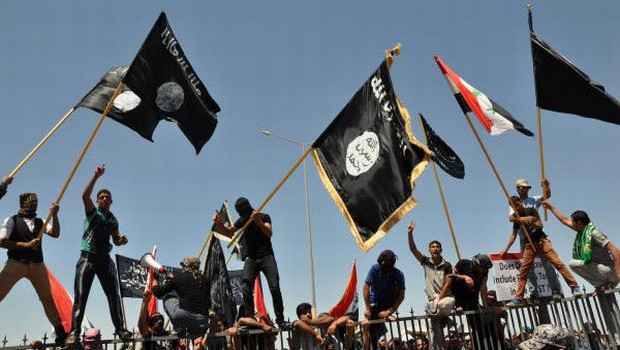
Masked Sunni protesters wave Islamist flags while others chant slogans at an anti-government rally in Fallujah on April 26, 2013.
(AP Photo)
Baghdad, Asharq Al-Awsat—On the surface, the city of Fallujah, which remains completely under the control of the Islamic State of Iraq and Syria (ISIS), appears to be a ghost-town. However a closer look at Anbar province’s second-largest city reveals that the situation in the city has become routine for the residents of Fallujah, who are getting on with their daily lives as normally as possible under ISIS occupation.
The capture of Fallujah earlier this year was a turning point for ISIS, representing the first time that the terrorist organization completely took control of an Iraqi city. ISIS quickly followed up its victory in Fallujah, taking control of Ramadi and advancing across Iraq’s restive western Anbar province. This, in turn, was a prelude to its announcement of an Islamic “state” comprising a vast area taking in eastern Syrian and western Iraq. Although Fallujah was the first city to be captured by ISIS, it will perhaps be the last city to be liberated from the terrorist group’s grip, despite the efforts of Iraqi government forces—backed by local tribal militias—which are advancing in other parts of Anbar.
One Fallujah resident, speaking to Asharq Al-Awsat under the assumed name of Abu Hamam in order to protect his identity, said that although Iraqi forces have liberated other areas of Anbar from ISIS control, including parts of the provincial capital Ramadi, Baghdad does not appear serious about retaking Fallujah at this time.
Abu Hamam criticized the “state of coexistence” between ISIS and the Iraqi government in and around the city. “The least that we can say is that there is a form of power sharing between ISIS and the Iraqi government [in Fallujah] which has no choice but to deal with the [terrorist] organization on some level,” he said.
The Fallujah-native pointed to a number of state-run services that continue to operate in Fallujah, such as hospitals and clinics. “There is a form of unpublicized understanding between the two sides, with doctors and pharmacists continuing their work in hospitals in the city without being subject to harassment while also continuing to receive their government salaries.”
Abu Hamam said that while ISIS had completely driven out government security and police forces from Fallujah, other government workers and civil servants, particularly those affiliated to the electricity and water departments, are allowed to continue to operate without interference from either side.
Maj. Tahsin Al-Mushrif, an Iraqi officer overseeing a checkpoint outside of the city of Fallujah, told Asharq Al-Awsat: “There is a kind of strange coexistence between ISIS and the government authorities.” He cited the example of checking papers at checkpoints: “ISIS has set up customs checkpoints and is imposing customs duties on trucks ranging between 50 and 300 US dollars, depending on the type of goods the truck is transporting. Iraqi security forces check these documents and if the money was not paid, this raises the possibility that the driver is ‘collaborating’ with ISIS,” Mushrif said. The idea being that a driver who does not have to pay this ISIS toll has direct ties to the terrorist organization.
“The central and southern provinces also have no choice but to deal with ISIS due to the reality of the situation on the ground and they reject the entry of any truck into these provinces that does not carry documentation proving that it paid the ISIS toll,” he added. In central and southern Iraq today it seems that it is safer for a truck driver to have an ISIS stamp on their documentation then to refuse to pay the ISIS tolls.
While it is perhaps not so surprising that Baghdad would have to deal with ISIS in one form or another, due to the presence of Iraqi citizens living in ISIS-controlled areas, it is surprising that ISIS would deal with a central government that it views as illegitimate.
An expert on armed groups from Iraq’s Al-Nahrain Center for Strategic Studies, Hisham Al-Hashimi, told Asharq Al-Awsat that ISIS has put in place surprisingly complex rules of procedure to deal with how it administers territory under its control.
“ISIS divides the regions that it is in control of into three types. There is the Dar Al-Harb [House of War] which is administered by military officials and whose inhabitants are viewed with suspicion and doubt and this includes areas like Hit, Hay Al-Bakr in Ramadi and Sulaiman Bek in Salaheddin province. There is Dar Al-Salam [House of Peace] which is most prominently administered by local residents via the so-called Hisbah system [Islamic administration under the caliphate], and this includes Mosul and Baaj. Finally, there are Dar Al-Mukhtalita [Mixed Areas], predominately in Syria.”
